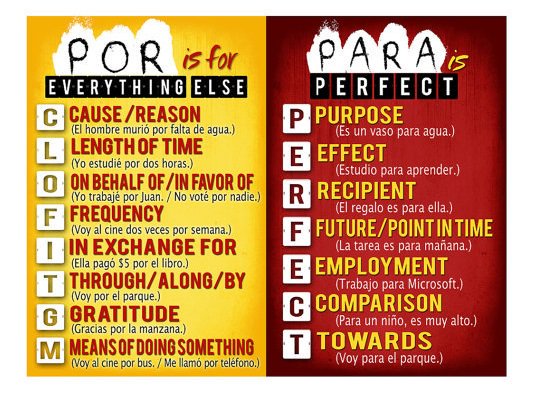In Spanish, por and para have a variety of meanings. However, language learners often feel confused when using "por" and "para" since they both can be translated as "for", "by", "on", "because of", "in order to", and some other prepositions. Here in this article, we will show you how and when to use por and para. Just keep reading to get por and para rules for usage.
Por vs Para Rules
When to use por in Spanish? - Por rules
Por is often used if you want to talk about movement, means of communication or travel, motivation, duration, etc.
1. Means and modes of travel and communication
Use por to talk about the way you communicate (phone, email, etc) or travel (car, train, bus, etc; or the route that you take).
Let's take a look at some examples below:
La contacté por correo - I contacted her by email
Prefiero viajar por tren y hablar por teléfono - I prefer to travel by train and speak by phone
Viajé por Francia y España - I traveled through France and Spain
¿Quieres pasar por el parque? - Do you want to go through the park?
2. Exchange
Él me dio diez dólares por el libro - He gave me ten dollars for the book
Te cambio mi manzana por tu sandwich - I'll trade you my apple for your sandwich
3. Duration or a length of time
Yo estudié por dos horas - I studied for two hours
Se puede ver las estrellas por la noche - One can see the stars during the night
4. When talking about motivation, cause, or reason
Examples:
El hombre murió por falta de agua - The man died for lack of water
Por su amor a los niños, quiere ser pediatra - Because of her love for children, she wants to be a pediatrician
5. Frequency or proportion
For example:
Voy al restaurante cinco veces por semana - I go to the restaurant five times per week
When to use para? - Para rules
1. Destination
Para is used when talking about physical destinations.
Let's take a look at some examples below:
El hombre salió para Madrid - The man left for Madrid
¿ Para dónde vas con tanta prisa? - Where are you going in such a hurry?
2. Recipient
Use para if you want to indicate the recipient of something.
Este regalo es para ti - This gift is for you
3. Deadline or specific time
Tengo que terminar esto para las ocho - I need to finish this by eight o'clock
4. Goal, or the use or purpose of something
Examples:
Trabaja mucho para ganar más dinero - He works a lot in order to earn more money
El vaso es para agua - The glass is for water
Corro para mantenerme en forma - I run to stay in shape

Por and para rules of usage in Spanish
You may want to know when to use Saber vs Conocer
It's really important to learn to use "por" and "para" correctly since if you substitute one for the other, then, you might end up saying something that is different from what you intended.
Follow our site if you want to get instant Spanish to English translation, expand your vocabulary, and improve your grammar.
